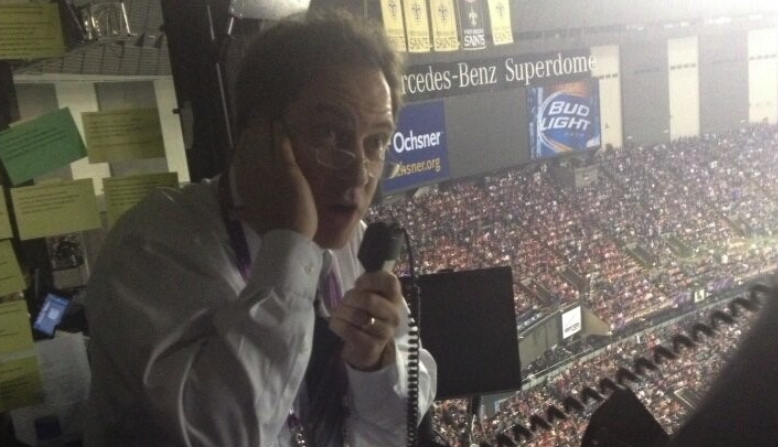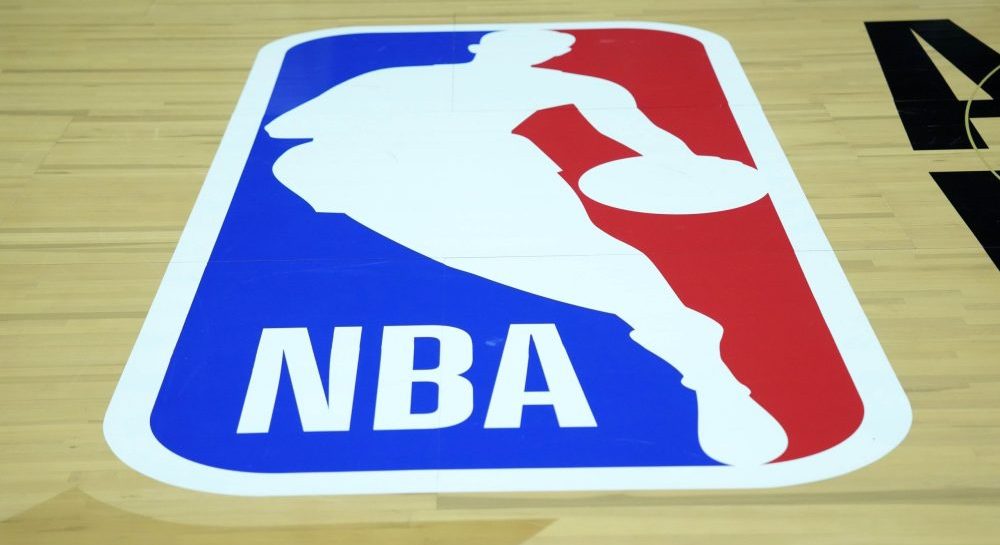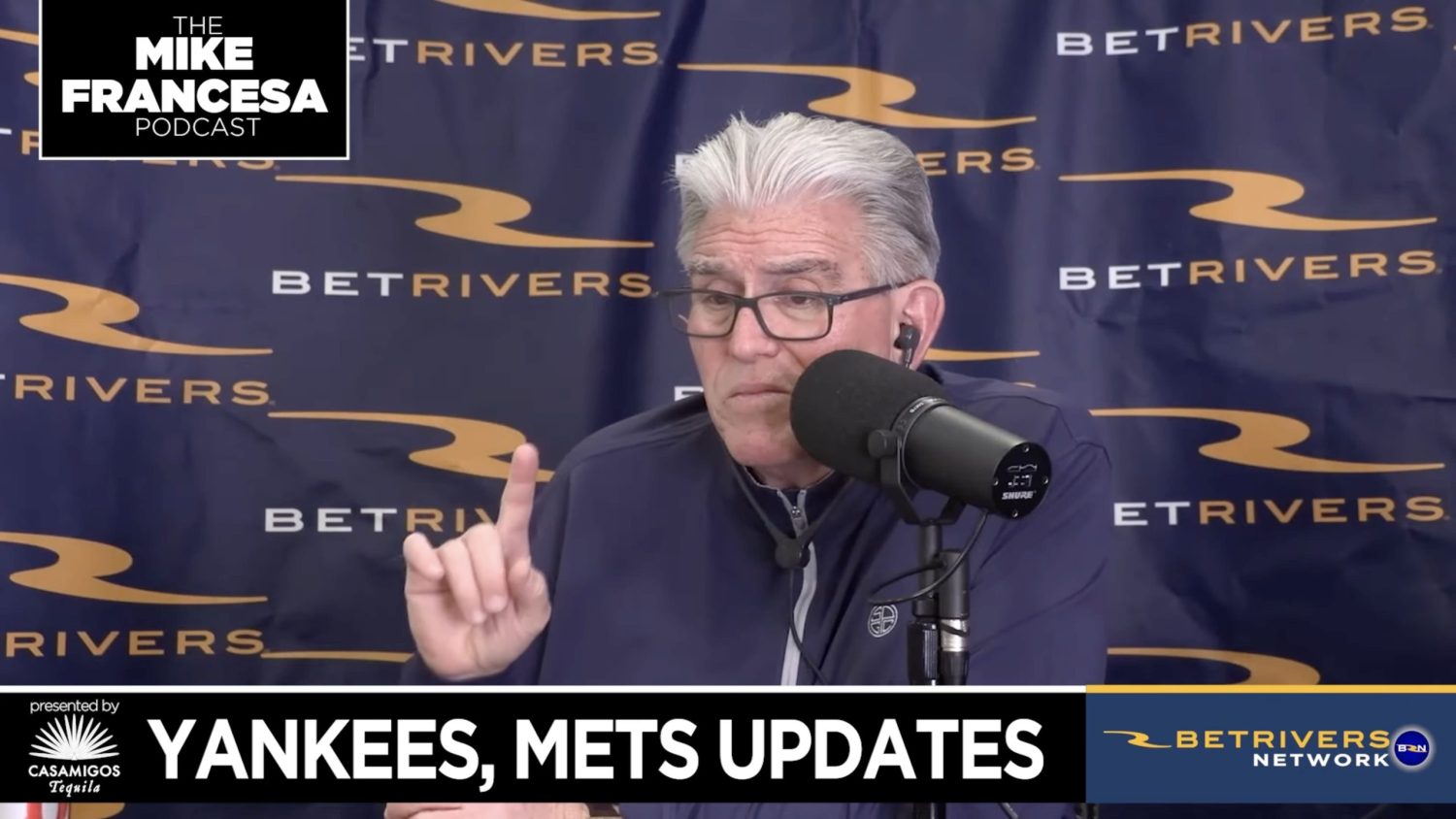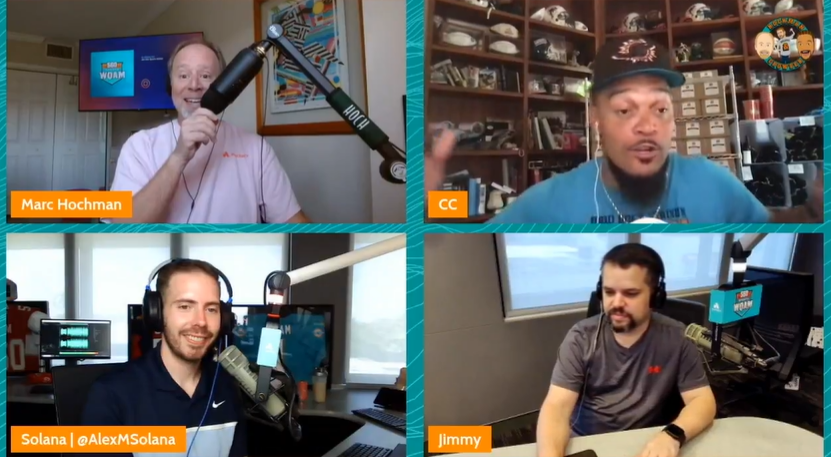Veteran broadcasters believe in fastidious preparation. They ready themselves for every type of technical glitch, weather anomaly, or hiccup. But there was no way play-by-play voice Kevin Harlan or his producer Howard Deneroff could have predicted the unforeseen events of February 3, 2013.
Happy 10th anniversary to one of the stranger moments we’ve seen in sports history. Where were you when the lights went out on Super Bowl XLVII in New Orleans? Like most of us, you were probably watching on television or listening to the radio and wondering what the hell was going on.
That game will be remembered for a lot of reasons. It pitted brother vs. brother as Baltimore Ravens coach John Harbaugh faced off against younger sibling Jim Harbaugh of the San Francisco 49ers. Colin Kaepernick almost rallied the 49ers to victory before falling 34-31.
And, there was that 34-minute power outage early in the third quarter. Electrical failure happens from time to time in sporting events but it was inconceivable that it would occur on the biggest broadcasting night in America.
"The Blackout Bowl", Super Bowl XLVII
— Kevin Gallagher (@KevG163) February 3, 2022
With 13:22 remaining in the third quarter, a partial power outage in the Superdome suspends play between the #Ravens and #49ers for 34 minutes.
Nine years ago today pic.twitter.com/XNGF5Vbc4l
If you were shocked, imagine how Harlan felt. One minute you’re calling the game on the radio for Dial Global on what was then state-of-the-art equipment. The next minute, you’re describing an unprecedented scene to a worldwide audience over a phone. (Dial Global later merged with Westwood One).
“Two things probably stand out,” Harlan recently told Awful Announcing. “No.1, just the stunning nature of it. ‘What happened?’ It was so sudden and all of our electronics went out, headsets, all the different things we use in that network broadcast booth went dead. Then the second thing is the look on (color commentator) Boomer Esiason’s face when it happened. He lost a lot of close friends in the 9/11 attack, and was still apprehensive, hesitant.”
The next thing Harlan recalled was Deneroff handing him a landline. This was not the first time Deneroff had experienced the unexpected in broadcasting.
He was a young producer fresh out of Syracuse University in 1989 when the World Series was interrupted by an earthquake. On that frightening day in San Francisco, Deneroff learned from Jack Buck how to transition from a sports story to a news story: Be descriptive. Tell people what you know. Also, tell them what you don’t know.
But even for Deneroff, this was new.
“There are only so many things you can plan for,” said Deneroff, now an executive producer for Westwood One. “Things happen in the game that you don’t expect. Things happen leading up to the game that you don’t expect. I’m a planner. I’m a type-A person. As many things that you can plan for and anticipate, that is obviously not one you anticipate. Certainly, you can lose power but you never expect a stadium to lose power. What I remember most is the moment of horror when I realized that we were completely off the air.”
A real lights out performance…
— NFL UK (@NFLUK) January 29, 2019
Who remembers the Blackout Super Bowl 👀@Ravens vs @49ers Super Bowl XLVII pic.twitter.com/HDU9L6Xspa
The radio broadcast of the Super Bowl went silent. To Deneroff, those 26 seconds off the air “felt like 26 years.” Commercials finally ran to fill time while everyone scrambled into action.
The Superdome wasn’t completely dark because backup power systems provided some light. And the phone lines were still operational. Deneroff grabbed an emergency hotline which was connected to back to the studios in New York and gave it to Harlan to use. Radio listeners were greeted by the following exchange. (Audio via Westwood One.)
Harlan: “Welcome back to the Superdome in New Orleans. We’ve had a power outage. Half the lights in the building are on. Half the lights are off. We have lost our complete electrical supply in our press box position. The players are milling around the field. The field is shrouded not in complete darkness but there is significantly less light in the Superdome. The scoreboards are out. The clock obviously is out. We have hooked up a second telephone line to Boomer. “
Esaison: “Alright Kevin, this is a weird situation as you and I are talking into the phone to each other and we are about a foot away from each other. It was interesting watching Beyoncé’s halftime show and how much electricity that must have taken. You noticed the buzz. You actually said ‘Do you hear that buzz in the building?’ It sounded like maybe a transformer or something buzzing. May be overloaded. That’s the only thing I can think of. I don’t want to surmise anything else. I’m hoping and I’m praying that it’s not anything other than that. There’s not a lot going on. There’s no announcement. We have no idea what’s happening here. All I can tell you is that this is about as bizarre as it gets.”
The blackout did produce one funny moment of audio during the outage. According to Deneroff, Esiason, who was also working pregame, halftime, and postgame for TV, was asked by CBS to leave the radio booth from high up in the Superdome. A stressed Harlan balked at that idea.
He said on the air: “Don’t leave for God’s sake. Don’t go down there. You stay up here with us now.”
Days later, it was determined that the outage was caused by a newly installed electrical relay device. But at the time, no one knew exactly what was going on.
When speaking with Awful Announcing, Harlan said that from a broadcasting point of view, the situation was similar to the scary Devin Hamlin injury. He worked that Monday Night Football game with Kurt Warner.
“You don’t have time to think about what you’re feeling,” Harlan said. “You put your professional hat on. It’s interesting. Your focus almost sharpens more in that situation just because everything is heightened: noises, what your eyes are telling you. In a football game, you’re expecting handoffs. You’re expecting catches and tackles. But in this, you’re literally going from second to second with what you’re seeing. And now, the task of describing is foremost in your mind.”
When power was restored, San Francisco stormed back from a 28-6 deficit but ultimately fell short in their comeback attempt against Baltimore. But that strange interruption is what many people remember most. What were the lessons learned? Deneroff said today there are even more backup measures in place to avoid losing the on-air broadcast.
“You never plan for everything,” he said. “But you try and do the best you can.”
[Photo and Audio via Westwood One]






